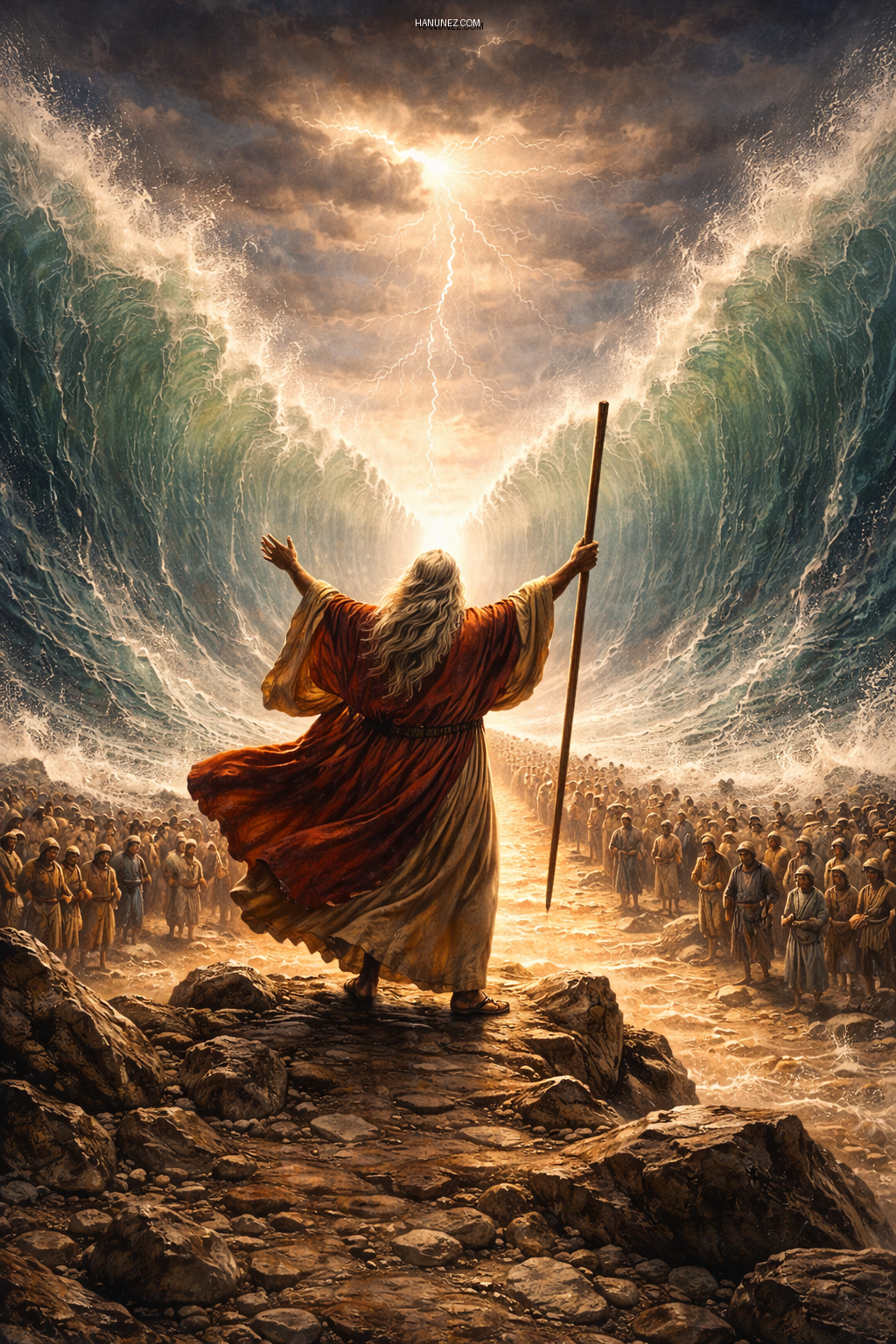1. Critical Thinking: The Path towards the Kingdom of Heaven

Moses’s Staff —
Have you ever paused before forming an opinion about someone or something and quietly wondered, “Am I right?” If so, you’ve already engaged in a bit of critical thinking—perhaps without even realizing it.
“Am I right?” is the question that sounds as simple as it seems, but it is the doorway to a new world of possibilities — the pause before certainty — the courage to look again — the willingness to listen.
When people hear the term critical thinking, they often imagine a complicated philosophical process where participants engage in discussions of abstract concepts. However, critical thinking is actually about playing devil’s advocate, being able to play in favor... or against any perspectives.
It involves questioning, conducting research, and thinking beyond the surface level— to avoid being fooled or misled by individuals or institutions who profit from ignorance, misinformation, and naivety.
At its core, critical thinking is not about attacking beliefs or proving others wrong. It is about seeking honest understanding.
It is about avoiding harmful consequences. It is a reminder that certainty —aka— being 100 % sure we possess the truth — is often overrated.
For over 6,000 years, humanity has been deceived by unscrupulous individuals and institutions who claim to be divinely connected to God. Yet, they do not provide guidance on: How to Align Ourselves with God — step by step, nor do they provide protection against leaders, such as Rodrigo Borgia (Pope Alexander VI), who ruined the World Order when he came along.
Critical thinking leads us to examine these individuals and institutions with care and restraint. This examination is not meant to strip meaning from faith, politics, or economics, but to understand how we can prevent the ruin of the New World Order through the use of our brains (critical thinking or awareness).
If I were to ask you what you would remove from Earth to improve it, what would your answer be? As for me, I would remove all the “bad people” from the world.
Yet when I reflect more deeply, and remember a humbling truth expressed in Mark 10:18: “No one is good—except God alone,” it passes.
“Why do you call me good?” Jesus answered.
“No one is good—except God alone.” (Mark 10:18)
There is no such thing as “good people” in the world. Yet some of us might argue. “But, I'm a good person, with "good intention," which I have no doubt about, but time has proven that we are “good” until someone really gets to know us.
That realization turns the mirror inward.
It suggests that the real work is not the elimination of the "bad people," but acquiring awareness of their existence, so we can defeat them. The Power is in the People (WE THE PEOPLE). We must increase our Levels of Consciousness and fight for what is right and just, defending our Judeo-Christian Values, despite the leaders who intend to ruin it all.
Critical thinking will allow us to be one step ahead of the wolves dressed in sheep's clothes.

Here is when Moses, Nathan, and Jesus (the Kingdom of Heaven) appear, speaking in figurative speech, to remind us that YHVH is in control.
It is tempting to think that the world’s poverty, problems, and war would vanish if only “bad people” were removed from Earth. However, no one knows when the evil inclination will touch our doors. Could we overcome the temptation when it comes? I highly recommend the present Power of the World that allows us to increase our Level of Consciousness to be ready for the next wave of evil.
If we, the People, are aware of human nature and its correlation with evil, we will succeed against what is coming. Here is when critical thinking is critical to avoid being misled by unscrupulous people — wolves dressed in sheep's clothes.
Unscrupulous people won't ever change. They will only adapt and reinforce their masks to use our resources once they are in the U.S. Don't waste your valuable time making them understand how degrading it is for a Judeo-Christian Society to abandon their God's Laws and Principles.
Understand that their days are numbered. Revelation 17!
Let's focus now on calling out those who are possessed by a spirit of naivety, reminding them that we must apply critical thinking to our discernments, having those discernments aligned with God's Laws and Principles.
Critical thinking will help us identify who is genuine and who is not, who is an ally and who is not, who is with the U.S., and who is wearing a mask, to set a Trojan horse in our soil? Remember, those who kneel to other gods hardly will honor yours and secretly will want you to kneel to their god. This is an Elohim (Salomon-Masonic-Yeshua-Amun-Ra) Nation. Jealous is our God.
What happened to Abednego (Azariah), Shadrach (Hananiah), and Meshach (Mishael), who refused to worship Allah (the ancient Islamic Babylonian God)?
Naivety, Islamism, and Communism have to go.
Jesus answered, “I am the way and the truth and the life. No one comes to the Father except through Me (John 14:6).

The ideal life on Earth cannot be achieved by simply wishing away "bad people." Instead, it stems from:
- Exposing our disparity of form with the Sun (Plato).
- Confessing our evil inclinations, masks, and shadows (Carl Jung).
- Practicing Stoicism (Epictetus and Marcos Aurelius), and exercising our ability for debate, logic, and critical thinking, as it was exemplified by Charlie Kirk on college campuses.
Transformation begins when we stop projecting evil outward and start examining it inward. This isn’t about bullying, scolding, or rejecting people. It’s about defending our Kingdom. It's about choosing science-based evidence over preference — It's about measuring what the aftermath of 'Cuba, and Venezuela' was after their association with the leftist Islamic-Communist party?
It's not about hating a social group. It's about contemplating what the consequences of promoting the Qur’an, Communism, and Islamism are.
It's not about the coexistence being impossible. It's about protecting our Constitution and declaring a death penalty for anyone who intends to touch it.
It's about contemplating what the consequences of promoting the Sodom-Gomorrah LGBTQ ideology in our school system are. It's about choosing Jacob-Salomonic Divine Knowledge over Leftist Human Knowledge (Lack of Principles).
As it is expressed in Hosea 4:6, which says:
My People are destroyed because they lack knowledge of me.
Because you rejected that knowledge,
I will reject you as a priest for me.
Since you forget the Law of your God,
I will also forget your children. (Hosea 4:6)
Here is a question worth contemplating: Why would the Creator of the Universe design a New Earth to be inhabited by individuals who are incapable of asking questions, conducting research, and thinking beyond the surface level?
Would you believe me if I told you that all prideful, stubborn, and naive individuals who reject God’s Principles for a leftist agenda are going to Hell?
I know! You might think that I'm an old-fashioned delusional man, and that is ok. But in the end, you know the difference between good and evil. Deep down, you know that I'm not going to be judged for doing nothing against evil, but the opposite. I will protect the U.S. Constitution — the future.
The question is, why are you supporting the evil? Are you rebelling against YHVH? Well, there will be a price to pay. Revelation 20!
You are not going to be in chains because you have committed one or two abominations against Yahweh, but because — "when Nathan appears" — you refused to employ the only thing that differentiates you from the animal kingdom... the capacity to use critical thinking — Instead of making a pause and think beyond the surface level you rejoy because "Nathan" was killed in front of everybody.
Why would the Creator of the Universe fill the New Earth with people who lack knowledge of Him and have no capacity to think critically?
Here is where the metaphor of Moses’s Staff becomes relevant.

Moses’s Staff—critical thinking—does not promise perfection. It does not make us "good people" or saints. But it will help us to stop before forming an opinion or making a decision. It will remind us that we have to ask questions, conduct research, and think beyond the surface level if we want to remain in Power anointed by the KING OF KINGS.
Moses’s Staff—critical thinking—will increase our chance to succeed, thanks to that moment when we stop to think. It will allow us to cross the sea of naivety without drowning in it. It'll help us to guide our Western Judeo-Christian-Slavic Society through the sea of darkness when the circumstances and evidence demand it.
Together, we are going to reach the state of Israel — “Straight to the Creator,” using the “magic wand” (Moses's Staff or Critical Thinking) as the foundation.
Critical thinking will clear the path to escape from Egypt (Witchcraft-Slavery) and Pharaoh (Month Pride). It will help us navigate through the sea of individuals who secretly aim to destroy our Judeo-Christian Western Society through the use of Unfounded Indoctrination, Evil Suggestion, and Mental Poisoning.
We are intelligent beings, worthy of being in the New Earth, not because we are "good people," but because we prove to the Universe that we can have open debate without killing our Counter-participants. We don't have any problem with acting beyond the animalistic level. We are open to conducting research and contemplating the reasons for God’s Principles and Perspectives.
Then the LORD said to him, “What is that in your hand?” “A staff,” he replied. (Exodus 4:2)

